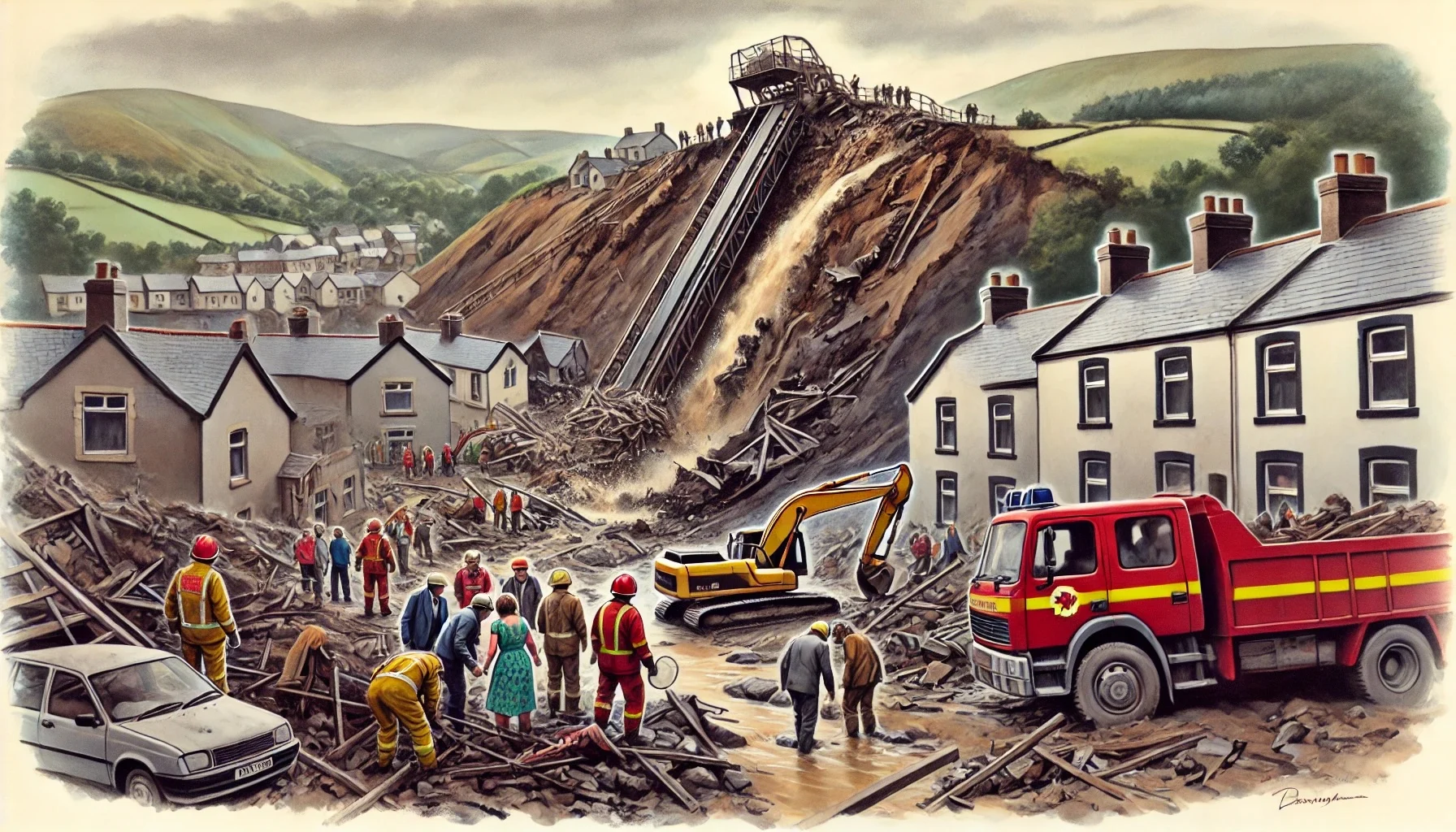
The 1966 Aberfan Mining Disaster
by: The Calamity Calendar Team
October 21, 1966
A Village Under the Shadow of Spoil Tips
Aberfan, a picturesque coal mining village in South Wales, lay under the looming shadow of Merthyr Vale Colliery’s spoil tips. These massive heaps of mining debris towered over the village, with Tip Number 7, used since 1958, precariously perched on a hillside above natural springs. This unstable foundation had been a cause for concern for years, but the warnings fell on deaf ears at the National Coal Board (NCB).
The Fateful Morning
In the days leading up to October 21, 1966, Aberfan experienced relentless heavy rain. On that ill-fated morning, as children settled into their seats at Pantglas Junior School, a catastrophe was unfolding above them. At approximately 9:15 AM, Tip Number 7 gave way. A colossal 140,000 cubic yards of coal waste thundered down the hillside with terrifying speed.
The Collapse
The landslide, a churning mass of black slurry, roared into the village, obliterating everything in its path. It smashed into Pantglas Junior School, where students had just begun their lessons, and several nearby houses. The speed and force of the avalanche left no time for escape. The school, once a place of learning and laughter, was now buried under tons of debris, engulfing 116 children and 28 adults.
Thanks for subscribing!
Immediate Aftermath
The scene in Aberfan was one of unimaginable horror. Parents, neighbors, and rescue workers frantically clawed through the rubble, driven by desperate hope. The village united in a grim, heart-wrenching effort to save those trapped beneath the wreckage. Despite their bravery and determination, the magnitude of the disaster meant that many lives were lost within moments of the collapse.
The Cost of Negligence
The immediate toll was devastating: 144 people, including 116 young children, were dead. The physical destruction of Pantglas Junior School and surrounding homes was immense, but the emotional and psychological scars on the community were even deeper. The loss of an entire generation of children cast a long shadow over Aberfan.
A tribunal was convened to investigate the disaster, revealing the stark truth: this tragedy was preventable. The NCB’s negligence, their failure to heed repeated warnings about the spoil tip’s instability, had led directly to the disaster. The tribunal’s findings were a damning indictment of the coal industry’s disregard for safety in pursuit of profit.
Response and Recovery
The response to the Aberfan disaster was immediate and multifaceted. Local miners, many of whom had lost their own children, worked tirelessly alongside emergency services to recover bodies and clear the debris. The sense of community and solidarity was palpable, even in the face of such overwhelming grief.
The disaster prompted significant changes in industrial safety regulations. The Mines and Quarries (Tips) Act 1969 was introduced, enforcing stricter controls and regular inspections of spoil tips to prevent such a catastrophe from occurring again. These new regulations aimed to ensure that no community would ever have to endure a tragedy like Aberfan.
A Lasting Legacy
Today, the memory of the Aberfan disaster is preserved through a memorial garden on the site of the former school, serving as a poignant tribute to the lives lost. Annual commemorations and educational programs continue to honor the victims, ensuring that their stories are not forgotten. The disaster stands as a sobering reminder of the importance of safety, oversight, and the human cost of industrial negligence.
The Aberfan mining disaster remains one of the darkest chapters in British industrial history. It is a story of unimaginable loss and profound sorrow, but also of resilience and the enduring strength of a community united in grief. The legacy of Aberfan continues to inspire changes in policy and practice, striving to prevent such a tragedy from ever happening again.
Stay in the Loop!
Become a Calamity Insider and get exclusive Calamity Calendar updates delivered straight to your inbox.
Thanks! You're now subscribed.